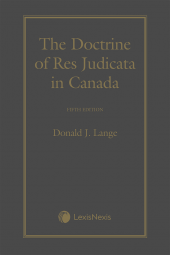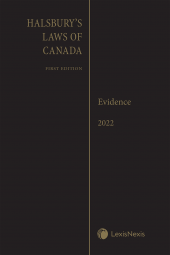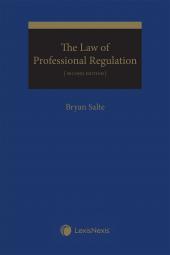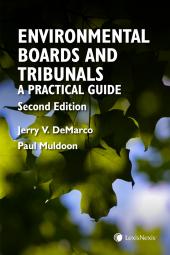The Doctrine of Res Judicata in Canada, 5th Edition
One Year Subscription Only Terms
Subscribers receive the product(s) listed on the Order Form and any Updates made available during the annual subscription period. Shipping and handling fees are not included in the annual price.
Subscribers are advised of the number of Updates that were made to the particular publication the prior year. The number of Updates may vary due to developments in the law and other publishing issues, but subscribers may use this as a rough estimate of future shipments. Subscribers may call Customer Support at 800-833-9844 for additional information.
Subscribers may cancel this subscription by: calling Customer Support at 800-833-9844; emailing customer.support@lexisnexis.com; or returning the invoice marked 'CANCEL'.
If subscribers cancel within 30 days after the product is ordered or received and return the product at their expense, then they will receive a full credit of the price for the annual subscription.
If subscribers cancel between 31 and 60 days after the invoice date and return the product at their expense, then they will receive a 5/6th credit of the price for the annual subscription. No credit will be given for cancellations more than 60 days after the invoice date. To receive any credit, subscriber must return all product(s) shipped during the year at their expense within the applicable cancellation period listed above.
Détails des produits
The Doctrine of Res Judicata in Canada, 5th Edition is the most recent volume on the doctrine of res judicata by Canada's recognized legal scholar on the subject, Donald J. Lange. The text is the definitive resource on an important legal doctrine: why a person can only sue or be sued once for each case.
The book's analysis, terminology and description of the law have been adopted by the Supreme Court of Canada, and have been cited on numerous occasions by provincial trial and appellate courts and by tribunals across Canada. The text provides a comprehensive distillation of the res judicata doctrine that has evolved in 200 years of Canadian jurisprudence.
Topics Covered
- Analyzes leading decisions from the Supreme Court of Canada and other Canadian courts on the interpretation and application of res judicata
- Explores fully the criteria to establish the doctrines of issue estoppel, cause of action estoppel, and abuse of process by relitigation
- Identifies and develops in detail the six essential estoppel doctrines
What’s New in This Edition
A review of over 2,000 Canadian decisions on res judicata and related doctrines since the fourth edition was published in 2015, including new coverage on:
- The impact of the Supreme Court of Canada case of Penner
- Issue estoppel and the burden of proof
- Cause of action estoppel and set-off and counterclaims
- Cause of action estoppel and discretion
- Rigour in the application of abuse of process by relitigation
- Finality and appeals
- Criminal proceedings and civil proceedings
- Small claims court proceedings and superior court proceedings
- Special circumstances and fraud
- Special circumstances and a change in the law
- The jurisprudence specific to collateral attack
- The doctrine of stare decisis
- Cost sanctions against lawyers
Who Should Read This Book
- Judges and tribunal officers when they exercise their discretion in the application of the estoppel doctrines
- Civil litigators who advise clients whether or not cause of action estoppel applies to a second proceeding
- Family lawyers who need to know when the estoppel doctrines apply to family property and custody disputes
- Administrative lawyers who obtain a tribunal decision but are faced with a second tribunal proceeding for the same issue
- Crown attorneys and criminal defence counsel who must consider the defence of issue estoppel and collateral attack
Table des matières
Chapter 1: The General Nature of Res Judicata
Chapter 2: Issue Estoppel
Chapter 3: Cause of Action Estoppel
Chapter 4: Abuse of Process by Relitigation
Chapter 5: Discretion and Special Circumstances
Chapter 6: Dispositions Without a Trial
Chapter 7: Specific Areas of the Law
Chapter 8: Related Doctrines
Bibliography
Table of Cases
Index
 Lexis Nexis
Lexis Nexis 


